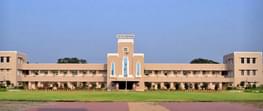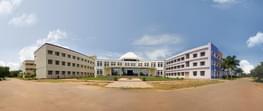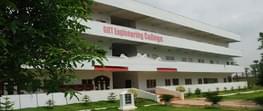Dr. R. V. V. Krishna is the Head of the Department of ECE at Aditya College of Engineering and Technology. He holds a PhD in Digital Image Processing from J.N.T.U.K. along with an M.Tech. in Digital Systems and Computer Electronics. He also holds a B.Tech. in Electronics and Communications Engineering at the undergraduate level as well. Since 2009, he has been working in academia at various institutes, such as J.N.T.U.H. and Gokaraju Rangaraju College of Engineering and Technology.
Dr. Krishna has written and published 11 papers in his area of expertise in reputed international and national journals. He has also presented ten papers at national and international conferences. Furthermore, he regularly attends workshops, conferences and seminars in his area of expertise. Dr. Krishna has three patents published in his name and is presently guiding two PhD students in their theses.

Being a HOD of the ECE Department, what are your roles and responsibilities towards the students?
Being a HOD, I have to see that the academic curriculum is followed regularly and that the student's problems are solved. I also try to make them industry-ready and prepare them to be immediately employable after graduation. I make sure our courses and subjects are up-to-date and on-trend with the latest industry topics to make sure our students have the right technical skills to be employable.
How do you tend to establish healthy relations with the students and fellow faculty?
I will conduct regular meetings with the faculty and also address the students every week. My goal is to maintain good relationships with the students by organising different events like workshops, paper presentations and extracurricular events. I will regularly meet with the class representatives on a weekly basis and whenever there are any problems. I try to always be open and available for them as well.
How do you try to bring in a practical approach towards subjects and make it industry-oriented?
Our college is, at present, an autonomous institute. We have a board of studies and one of its members is from the industry. We take input from all board members, particularly industry professionals, to know what changes should be included in the curriculum and subjects. After feedback and discussions, we implement their suggestions. Moreover, we invite different speakers from the industry to deliver lectures and talks for the students. They also help us improve our curriculum so that it is aligned with the industry's needs.
What are the best practices offered by the department to the students that help them gain the necessary skills?
Regarding our college’s best practises, we use blended learning and participatory learning methods. We get our students to do role play in the classes and we don't allow cell phones during the classes. We have also taken care to implement innovative and on-trend methods in the lab. We use case studies and have our students complete internships as part of the curriculum, which prepares them to work in the industry as well.
How do you strategize the curriculum and how often it get updated to make it befitting for the students?
As I mentioned, we are now autonomous and we have the autonomy to design our own curriculum. We have the freedom to increase, decrease or change our curriculum and subjects as per our needs, keeping into account our affiliated university’s rules and regulations. Our board of studies also regularly meets to strategize and take feedback on what changes our curriculum needs. During this process, we also take into account our student’s opinions.
Check Aditya College of Engineering and Technology Faculty
What are your views on the placements and higher education of the students from your department? How does your department prepare students for Higher education?
Our students are getting enrolment and admissions to highly ranked and leading universities in the US, UK and Australia. We also conduct awareness programs or career guidance programs related to GRE, TOEFL and IELTS examinations. Moreover, we have an agreement with one of the coaching institutes to provide coaching for competitive examinations for international admissions, such as the GRE and TOEFL. Interested students receive recommendation letters for admissions as well. For placements, students receive placement training through our T-hub where the latest advancements in software are taught to the students. Students receive certifications upon completion of these courses. Through all these efforts, we have around 80% to 90% placement records.
How do you help your student cope with the competition being so high in the outside world?
We are preparing our students to be tough by engaging them in different assignments and projects. We are oriented towards giving students real-world assignments and projects so that they can learn and develop the skills their particular field of study requires. We also teach them the right soft skills and technical skills to survive in the industry and stand out from the competition during interviews.
Do you have any extracurricular activities/ programs to enhance the skills of the students or expose them to real-world challenges?
We regularly conduct extracurricular activities not only to give our students a break from their studies but also to give them a chance to display their administrative and leadership skills. We have our annual tech fest called Colors where students are encouraged to develop other skills like singing, and dancing. On all the special days, like yoga day, we conduct events for our students to participate in. We also have state-of-the-art sports facilities in our college where students are encouraged to participate.
What are the challenges you faced/ are facing to uplift the quality of education of your department?
Regarding the challenges we face, all the jobs in the industry at present are in software. So, we are trying to strike a balance between the core studies in electronics and software. Students are encouraged to develop their skills in both aspects. At the same time, we encourage the students to participate in examinations like GATE and EES. Another challenge is our location. Since most of our students are local and we are in a rural location, our students have faced communication issues. For them, we are holding extra classes to bring them up to par with other students.
When you came to college, what was your vision and how are you trying to achieve the same?
My vision is to improve the overall quality of the department, both in terms of research and education. For that, we are trying to bring funding to the college and are also trying to improve the overall research culture in the department. Towards that end, we are trying to establish ourselves as a research centre. I wish to develop the department to be known for new innovations that come from the students and the staff.

![Aditya College Of Engineering and Technology - [ACET]](https://image-static.collegedunia.com/public/college_data/images/logos/1480059954logo 564.png?h=71.7&w=71.7&mode=stretch)
.png?h=132&w=263&mode=stretch)




.png?h=132&w=263&mode=stretch)

.png?h=78&w=78&mode=stretch)













![Aditya Engineering College - [AEC]](https://image-static.collegedunia.com/public/college_data/images/appImage/12733_cover.jpg?h=111.44&w=263&mode=stretch)





.png?h=72&w=72&mode=stretch)



 (4).jpeg?h=72&w=72&mode=stretch)
 (2).jpeg?h=72&w=72&mode=stretch)
 (8).jpeg?h=72&w=72&mode=stretch)
.png?h=72&w=72&mode=stretch)
.png?h=72&w=72&mode=stretch)



















Comments